
Bee Campuses Support NC Agriculture, the Economy, and Your Coffee Habit
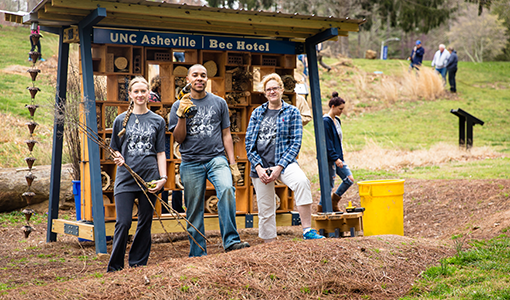
Take a moment to gaze at your morning mocha latte. Odds are good there’s a bee in your drink, and for that you can be thankful.
June 17-23 is National Pollinator Week, so it’s an appropriate time to reflect on the fact that caffeine isn’t the only buzz in your cup. Bee pollination played an important role producing the coffee beans, not to mention the alfalfa that the dairy cattle most likely consumed. That beverage that puts the bounce in your step might seem expensive now, but the price would nearly double without bees’ generous labor … and that would really sting.
Many campuses across the UNC System have dedicated time, effort, and resources to establishing and preserving bee habitats. In fact, Appalachian State University, The North Carolina Arboretum, UNC Asheville, and UNC-Chapel Hill are designated Bee Campuses.
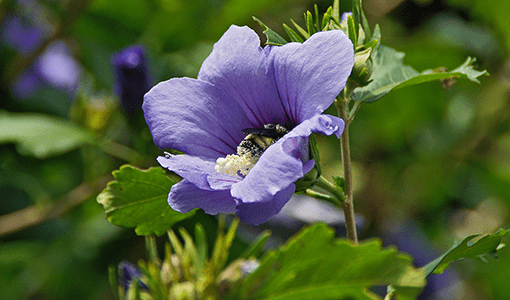
This work is vital for many reasons. Nearly a third of the food we eat depends on insect pollination. The U.S. Department of Agriculture estimates that more than $15 billion in U.S. agricultural production depends on the health and well-being of honey bees. On the state level, bees play a significant role in our economy.
“Honeybees contribute more than 70 million dollars annually to our state’s agricultural economy through the pollination of crops such as apples, cucumbers, and blueberries,” explained Cathy Whitlock, UNC Asheville mathematics lecturer and instructor of the university’s first year seminar course called Honeybees and Humans. “This could be why the honeybee is also North Carolina’s state insect.”
And here’s a sweetener: ninety percent of the flowers that brighten our days require cross pollination.
And yet, bees are in peril, due to the loss of habitat, pesticides, and other factors. According to a White House report, between 1947 and 2014, the number of managed bee colonies in the U.S. declined from six million to less than three million.
The Bee Campuses are trying to reverse this trend, further exemplifying how the work taking place across the UNC System is helping to keep food on the table in more ways than one.
Committing to Sustainability
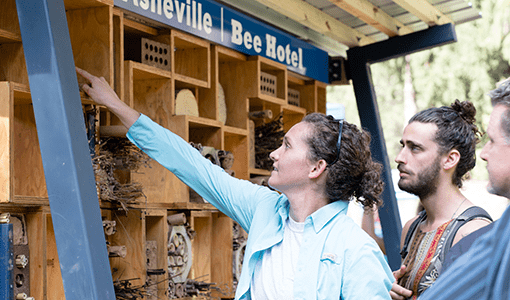
Bee Campus USA, an offshoot of Bee City USA, is a national movement aimed at raising awareness of how important bees and other pollinators are to our lives. Both Bee Campus and Bee City USA are initiatives of the Xerces Society, an international nonprofit, science-based organization dedicated to the preservation of invertebrates.
Currently there are 73 Bee Campuses across the United States. To earn this designation, each institution commits to plenty of hard work: developing a campus habitat plan, organizing awareness campaigns, establishing service learning opportunities and engagement activities, and building curricular or continuing education options around the issue of pollination.
In 2016, The NC Arboretum became the first campus in North Carolina—and the seventh campus in the nation—to earn the designation.
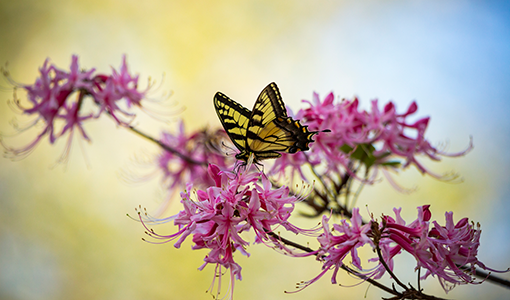
“Pollinators are responsible for the production of more than three-quarters of the world’s plant and tree species, and greatly contribute to our food security, economy, and environmental health. However, there has been a steady decline in honeybees and other pollinators like monarch butterflies due to loss of habitat, pesticides, and other human impacts over the years,” explained George Briggs, executive director of The NC Arboretum. “By becoming a designated Bee Campus USA, we expanded our pollinator conservation efforts to provide members, visitors, and students with more educational opportunities and resources.”
UNC Asheville was the first school in North Carolina—and the eighth in the country—to earn the designation.
“UNC Asheville has long dedicated itself to sustainability, and this includes working to protect bees and other pollinators,” said Jackie Hamstead, UNC Asheville Environmental Specialist. “Pursuing the Bee Campus designation was a way for us to formalize our commitment to protecting habitats for pollinators.”
A Swarm of Activity … Without the Hive Mentality
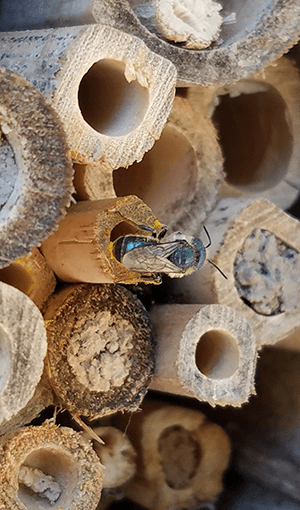
All Bee Campuses are motivated by the same goal, but the approaches to achieving this goal vary from institution to institution.
At UNC-Chapel Hill, Heather Summer, collections manager and seed program coordinator for the North Carolina Botanical Garden, has been busy finalizing a “pollinator tool kit” to help North Carolinians create pollinator-friendly habitats across the state. Elsewhere on campus, the Sustainability Office and the Three Zeros Environmental Initiative are planning an elaborate pollinator habitat for the new solar farm that’s under construction.
At The NC Arboretum, milkweed way stations keep pollinators busy. On- and off-site educational programming raises public awareness, and some of this programing emphasizes that bees aren’t the only important pollinators. The Arboretum collaborated with Xerces Society, Bee City USA, and Asheville Green Works to host an Introduction to Mothing workshop in June. Plans are currently on the wing to host Monarch Month in September, which will feature a pop-up butterfly chrysalis display, pollinators classes, milkweed plant sales, and The Arboretum’s annual Monarch Butterfly Day on September 28.
One of unique focal points of UNC Asheville’s efforts is its Bee Hotel. While the hives on campus provide a home for honeybees, which need a sense of togetherness when they nest, the Bee Hotel is specifically designed to attract solitary nesters—the loners who prefer the solitude of a small crack, cavity, or crevice.
The hotel itself features a wide variety of surfaces: stems, reeds, predrilled holes … all the places where solitary nesting bees like to hide and reproduce. A lone female bee will use one of these spaces to lay her eggs. This will require her to provision the nest by herself. She will gather pollen and nectar and stuff the concoction (known as “bee bread”) into the bottom of a hollow stem. She will lay an egg on top of the sweet mixture. Then she will repeat the process. In some cases, 20 eggs will fill a single nest.
Jackie Hamstead sees the university’s emphasis on solitary nesters as an important contribution to North Carolina’s pollinator awareness campaign.
“There are over 500 species of bees in North Carolina, and only one is a honeybee. Most are solitary nesters,” she exclaimed. “Mention the word bee, and most people automatically think of honeybees. But there are as many as 20,000 species of bees globally. For a point of comparison, there are only 5,000 species of mammals. Our work promoting the solitary nester is relatively unique and important.”
This focus on native solitary nesting bees has an added benefit for those students and faculty who might otherwise be wary of the Bee Campus designation: solitary nesting bees don’t defend a hive, they’re not aggressive, and their stings are less painful. In fact, some aren’t even equipped with a stinger at all.
As part of UNCA’s engagement and education efforts, it freely distributes design blueprints for the Bee Hotel for non-commercial use through the Office of Sustainability website. North Carolina has long been proud of its reputation as a hospitable place to live and visit. As pollinator toolkits and blueprints for bee hotels spread across the state, this reputation will no doubt extend to attract more of our indispensable insect friends, who will no doubt be drawn to the new, luxury bee-friendly habitats North Carolina has to offer.
Bees Put Breakfast on the Table
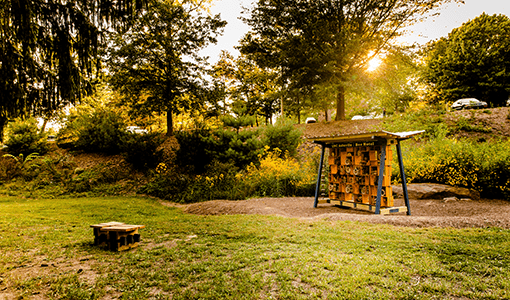
This week as you sip your morning coffee, imagine how difficult it would be to get your day off the ground without your morning jolt … or without the food, for that matter.
Across North Carolina, something resembling a massive continental breakfast is being organized. By building hotels and preserving floral spaces, UNC System institutions are ensuring that bees have access to the habitats they need to thrive. For their part, bees are bringing the bee bread, honey, the fruit, the almonds, the grains, and even the coffee to the table.